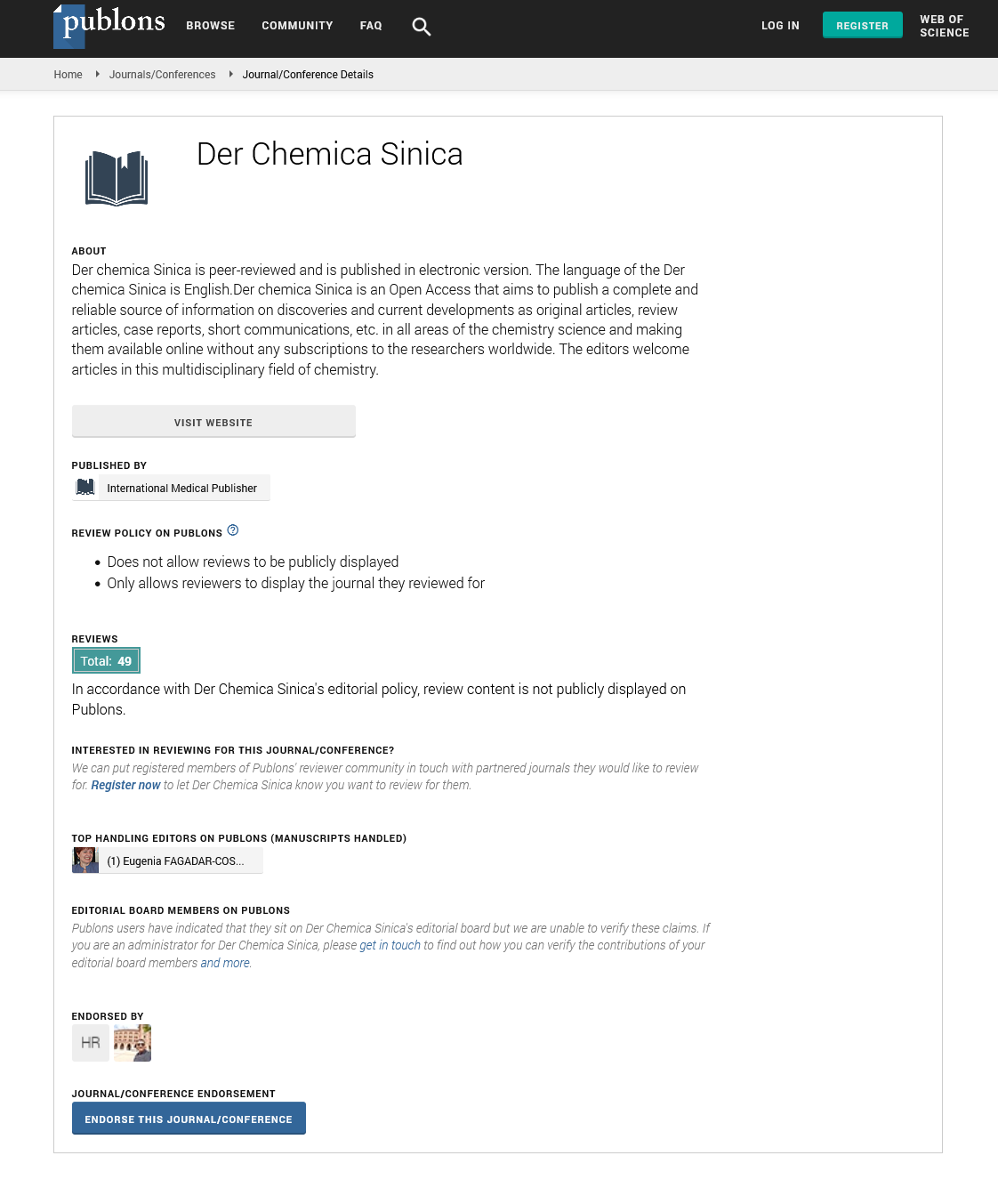The primary mission of the Der chemica Sinica is to become the premier source of high quality research from whole of the world. All authors not only receive fast and comprehensive peer-review but also the article promotion to researchers working in the same field.
Der chemica Sinica is peer-reviewed and is published in electronic version. The language of the Der chemica Sinica is English. Der chemica Sinica is an Open Access that aims to publish a complete and reliable source of information on discoveries and current developments as original articles, review articles, case reports, short communications, etc. in all areas of the chemistry science and making them available online without any subscriptions to the researchers worldwide. The editors welcome articles in this multidisciplinary field of chemistry.
Submit Manuscript: Submit manuscript via https://www.imedpub.com/submissions/der-chemica-sinica-journal.html or as an email attachment to the Editorial office at editor@imedpub.com
Window control
Journal Impact Factor: 0.676*
Scope:
Agrochemistry, General Chemistry, Analytical Chemistry, Geochemistry, Environmental Chemistry, Green Chemistry, Polymer Chemistry, Inorganic Chemistry, Petroleum Chemistry, Kinetics, Agricultural Chemistry, Medicinal Chemistry, Astrochemistry, Nanochemistry, Biochemistry, Nuclear Chemistry, Chemical Engineering, Organic Chemistry, Cluster Chemistry, Photochemistry, Combinatorial Chemistry, Physical Chemistry, Electrochemistry, Polymer Chemistry, Environmental Chemistry, Solid State Chemistry, Food Chemistry, Spectroscopy
Fast Editorial Execution and Review Process (FEE-Review Process):
Der Chemica Sinica is participating in the Fast Editorial Execution and Review Process (FEE-Review Process) with an additional prepayment of $99 apart from the regular article processing fee. Fast Editorial Execution and Review Process is a special service for the article that enables it to get a faster response in the pre-review stage from the handling editor as well as a review from the reviewer. An author can get a faster response of pre-review maximum in 3 days since submission, and a review process by the reviewer maximum in 5 days, followed by revision/publication in 2 days. If the article gets notified for revision by the handling editor, then it will take another 5 days for external review by the previous reviewer or alternative reviewer.
Acceptance of manuscripts is driven entirely by handling editorial team considerations and independent peer-review, ensuring the highest standards are maintained no matter the route to regular peer-reviewed publication or a fast editorial review process. The handling editor and the article contributor are responsible for adhering to scientific standards. The article FEE-Review process of $99 will not be refunded even if the article is rejected or withdrawn for publication.
The corresponding author or institution/organization is responsible for making the manuscript FEE-Review Process payment. The additional FEE-Review Process payment covers the fast review processing and quick editorial decisions, and regular article publication covers the preparation in various formats for online publication, securing full-text inclusion in a number of permanent archives like HTML, XML, and PDF, and feeding to different indexing agencies.
General Chemistry is the study of matter, energy and the interactions between them. The modern course in general chemistry is based on the study of atomic structure and Mendeleev's periodic law. General chemistry includes topics such as stoichiometry, thermodynamics, nuclear chemistry, electrochemistry, chemical kinetics, physical chemistry, acids and bases, atomic structure, the periodic table, chemical bonds, and chemical reactions Conservation of energy, Conservation of mass, Elementary atomic theory, constant composition, Gas laws, Solubility. General Chemistry introduction to a variety of concepts in chemistry
Cluster chemistry is one of the latest topic in Inorganic Chemistry. In chemistry, a cluster compound is considered as a compound with a triangular or larger closed polyhedron of metal atoms. Clusters exist in various stoichiometries and nuclearities. For example, carbon and boron atoms form fullerene and borane clusters. Transition metals and main group elements form robust clusters. cluster was the term introduced by F.A. Cotton to refer to compounds containing metal–metal bonds.clusters include: Atomic clusters , Molecular clusters, Transition metal carbonyl clusters, Transition metal halide clusters, Boron hydrides, Fe-S clusters in biology, Zintl clusters, Metalloid clusters, Catalysis by metal carbonyl clusters.
Chemical Synthesis is the formation of of complex chemical compounds from simpler chemical compounds. It is a process by which many chemical reactions are performed to convert reactant into a product or multiple products. Chemical Research in Chemical Synthesis is the basis to discover compounds with new physical or biological properties.chemical compounds that occur in the nature are synthesized by chemists to understand their structures. Chemical Synthesis involves breaking of existing bonds and the formation of new bonds.
Coordination chemistry is the branch of chemistry in which compounds having central metallic atom are surrounded by molecules or anions called ligands. The ligands are attached to the central atom by dative bonds, also known as coordinate bonds, in which both electrons in the bond are supplied by the same atom on the ligand. Metal complexes are also called coordination compounds.metal complex is the coordination complex whose centre is a metal atom. Coordination is the "coordinate covalent bonds" or dipolar bonds between the ligands and the central atom.
Solid-state chemistry or materials chemistry, is the study of the synthesis, structure, and properties of solid phase materials of non-molecular solids. Solid state chemistry is the study of chemical, structural, thermodynamic, electronic, magnetic, and optical properties and processes in solids. Solid state chemistry includes Bonding in solids .solid state chemistry includes topics such as Crystal chemistry ,Crystal growth mechanisms ,Synthesis of new compounds ,Materials Chemistry ,High-pressure processes ,Magnetic properties of materials ,Optical characterization of materials ,Order-disorder ,Phase equilibria and transformation mechanisms , Reactions at surfaces ,Statistical mechanics of defect interactions ,Structural studies ,Transport phenomena







